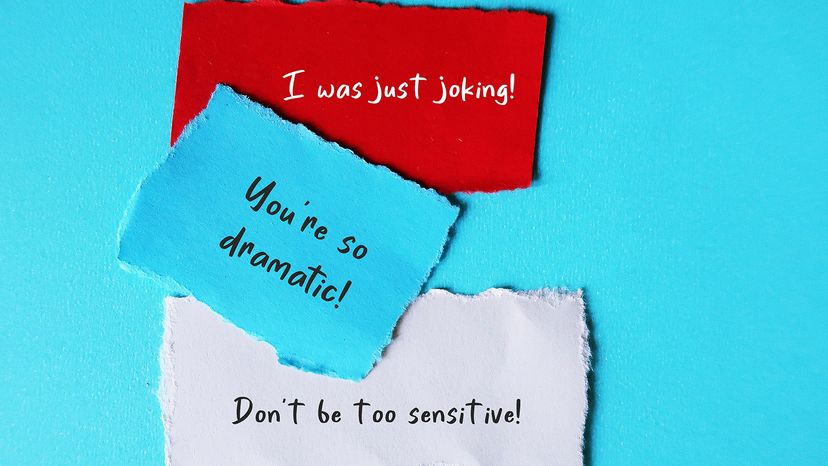
New York-based political commentator Irina Tsukerman often debates other people in a public setting and sometimes has been accused of gaslighting when the argument gets heated.
"During these debates they have generally claimed that I was gaslighting them or the audience (despite the fact that I was arguing on the substance) as a way to undermine my credibility," she explains in an email interview.
She's also been accused of gaslighting in online forums as well. "People would literally report me as commenting on a particular topic even though I've said no such thing or said something entirely different, as a way to present me a certain way, and would even occasionally go back and delete their own comments so it would seem like I am talking to myself or attacking them for no reason."
But Tsukerman knows that gaslighting is the wrong word to use in these situations. "In reality, gaslighting is a practice that takes time to build up; you generally can't make people think they are crazy during one debate or discussion."
Indeed, "gaslighting" can be added to the list of words that have spilled over from clinical psychology into popular nomenclature. While increased understanding of mental health issues is generally a good thing, it falls decidedly flat when terms like gaslighting, ADHD, OCD and such are grossly misused. All three have become popular slang terms for feelings and experiences that are nowhere near what the terms mean.
Advertisement
The Origin of "Gaslighting"
The word "gaslight" (as a psychological term) comes from a 1936 play titled "Gas Light." Later made into the 1944 film "Gaslight" starring Ingrid Bergman, the storyline depicts the heroine being emotionally abused to the point where she is led to believe that she's a kleptomaniac. In the plot, her husband (played by Charles Boyer) messes with her mind by making sounds in the attic and dimming the gas lights in the house, then denying that either of those things are actually happening when she mentions them. The point of this subterfuge is to have her question her sanity so that she will agree to be institutionalized, thus allowing the husband to get his hands on her valuable jewels.

"Gaslighting" was one of Oxford Dictionary's words of the year for 2018. Some attribute the increase in usage as a reaction to President Donald Trump's habit of denying he said something after it was clear that he had, and doubling down on his denial when caught in a lie.
Advertisement
What Gaslight Really Means Vs. How People Use It
"The biggest place I see it misused is when people refer to others who have a strong opinion or idea or perception that is different from their own," says psychologist Dr. Mark Sharp with the Aiki Relationship Institute via email. "When those people argue for something that doesn't fit their own experience, they call that gaslighting. I run into it in my relationship counseling business quite a bit."
Gaslighting is actually a far more complex form of psychological manipulation than just lying or disagreeing. It's also known as the more technically accurate "coercive control," emails Dr. Monica Vermani, a clinical psychologist in Toronto and author of "A Deeper Wellness: Conquering Stress, Mood, Anxiety and Traumas." "Referring to disagreements and attempts to convince, influence or sway someone's opinion as gaslighting contributes to serious misunderstanding and trivializing of this dangerous and destructive form of manipulation and control," she adds.
An argumentative person trying to get you to change your mind in the here and now or lying to you is not necessarily gaslighting you. "Gaslighting is a deliberate and complex means of intentionally controlling an individual, carried out over an extended time," she explains, noting that the gaslighter's goal is to get the target to "doubt their perceptions and thoughts to the point where they lose faith in and distrust their sense of reality, reason, and understanding of facts and situations."
Sadly, gaslighting is commonly done by someone close to the victim, such as a romantic partner, family member or a close work associate or friend. Often, the gaslighter was victimized in this manner as a child, Vermani notes. "These manipulative behaviors, modelled by parents and other family members, become their blueprints... and their own childhood abuse is later repeated in their adult relationships," she explains. "Thus, while their behaviors are intentional, they may be unaware of the abusive nature of their actions."
Advertisement
How to Spot Gaslighting
Often, gaslighting is a very nuanced, gradual process that can be difficult to detect. The "long game" is being played here, in form of manipulation in the following ways:
- Witholding: The gaslighter won't listen to the victim or acts like they don't understand.
- Countering: The abuser questions the victim's memory and recollection of events.
- Trivializing: The abuser makes the victim feel as though they are being irrational about their concerns or making too big a deal of them.
- Forgetting: The abuser denies outright that a particular thing happened or pretends to have forgotten about it. One large-scale example of gaslighting is when people deny documented events, like the Holocaust.
- Diverting: The gaslighter changes the subject or focuses on the credibility of the person speaking versus the content.
The gaslighter might repeat sentences like, "You never remember things correctly," "You're imagining things," "You're too sensitive" and "I don't know what you're talking about," among others. All these are designed to make the victim second-guess themself.

People who are being gaslighted typically start to experience the following:
- increasing, overwhelming self-doubt (because their reality is always being challenged)
- loss of confidence and trust in their judgment and personal sense of reality
- low self-esteem because the abuser constantly undermines and questions their perceptions and sense of reality
- confusion, instability and a sense of not being safe
- isolation from loved ones who can validate their feelings and recollections
- attention, praise and affection from the gaslighter when they try to break away
Long-term, they may experience anxiety, depression and lasting trauma
Advertisement
What to Do If You're Being Gaslighted
If you feel you're being gaslighted, first collect evidence. Keep a record or journal of what the gaslighter said to you versus what you observed, advises Dr. Harold Hong, a board-certified psychiatrist at New Waters Recovery, located in North Carolina. "This can also help you communicate what's been happening to friends, family or mental health professionals," he says. You can also take photos or create voice memos if necessary to keep memories straight.
When the gaslighter is trying to manipulate you, call them out on it. "For example, you could say something like, "I know what you said; I was there when you said it," says Hong.
If you feel the need to leave the gaslighter, solicit support from other loved ones or community support systems. And take steps to eliminate all communication with and ties to the gaslighter. Block calls or change phone numbers if you have to.
"It is critical not to engage the gaslighter in discussions about your decision to sever ties," Vermani says, as the gaslighter might well manipulate you into changing your mind. Lastly, she advises to get help from a mental health expert "to help you reestablish your sense of self and set healthy boundaries."
Advertisement

